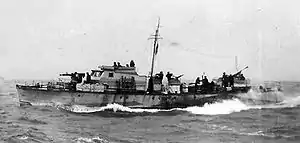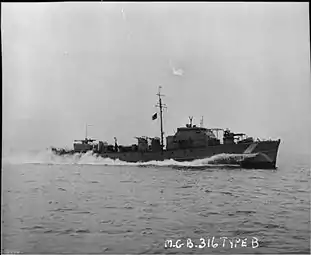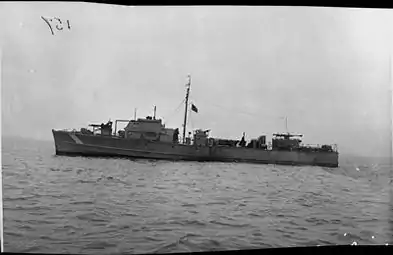Fairmile C motor gun boat
The Fairmile C motor gun boat was a type of motor gunboat designed by Norman Hart of Fairmile Marine for the Royal Navy. An intermediate design, twenty-four boats were ordered on 27 August 1940 and were completed in 1941; they were initially rated as Motor Launched (ML), but received the designation Motor Gun Boats (MGB) on 1 August 1941, being numbered MGB 312–335.
 The Fairmile C motor gunboat MGB 314 | |
| Class overview | |
|---|---|
| Name | Fairmile C motor gunboat |
| Preceded by | Fairmile B motor launch |
| Succeeded by | Fairmile D motor torpedo boat |
| Completed | 24 |
| Lost | 5 |
| Retired | 19 |
| General characteristics | |
| Displacement | 72 tons |
| Length | 110 ft (34 m) |
| Beam | 17 ft 5 in (5.31 m) |
| Draught | 5 ft 8 in (1.73 m) |
| Propulsion | Three 850 hp (630 kW) supercharged Hall-Scott petrol engines |
| Speed | 26.5 knots (49.1 km/h; 30.5 mph) |
| Range | 500 nmi (930 km; 580 mi) at 12 knots (22 km/h; 14 mph) (Bunkerage: 1,800 gal + extra 2,600 gal) |
| Complement | 2 officers + 14 crew |
| Armament |
|
Design
The Fairmile type C was a re-use of the hull form of the type A but with the lessons learned from the type A incorporated in terms of steering and deck layout.
Boats
| Name | Ship Builder | Completed | Fate |
|---|---|---|---|
| MTB 312 | Woodnutt & Co., St Helens, Isle of Wight | 16 June 1941 | Sold for disposal in October 1945. |
| MTB 313 | James N.Miller & Sons, East Shore, St Monance, Fife | 12 June 1941 | Sunk by mine 15 August 1944. |
| MTB 314 | A. M. Dickie & Sons, Bangor, Gwynedd | 26 June 1941 | Sunk in St Nazaire Raid on 28 March 1942. |
| MTB 315 | Alex Robertson (Yachtbuilders) & Sons, Sandbank, Argyll | 10 July 1941 | Sold for disposal in October 1945. |
| MTB 316 | Tough Bros, Teddington Wharf, Manor Road, Teddington | 19 May 1941 | Sold for disposal in October 1945. |
| MTB 317 | Alex Robertson (Yachtbuilders) & Sons, Sandbank, Argyll | 3 September 1941 | Sold for disposal in October 1945. |
| MTB 318 | Aldous Successors, The Shipyard, Brightlingsea | 6 July 1941 | Sold for disposal in October 1945. |
| MTB 319 | Brooke Marine, Oulton Broad, Lowestoft | 4 September 1941 | Sold for disposal in January 1946. |
| MTB 320 | Alex Robertson (Yachtbuilders) & Sons, Sandbank, Argyll | 23 August 1941 | Sold for disposal in October 1945. |
| MTB 321 | James A. Silver, Rosneath, Dumbartonshire | 9 July 1941 | Sold for disposal in October 1945. |
| MTB 322 | A. M. Dickie & Sons, Bangor, Gwynedd | 29 July 1941 | Sold for disposal in October 1945. |
| MTB 323 | Kris Cruisers (1934), Riverside Yard, Ferryll Road, Isleworth | 11 July 1941 | Used as target from February 1945. |
| MTB 324 | Woodnutt & Co., St Helens, Isle of Wight | 4 September 1941 | Sold for disposal in October 1945. |
| MTB 325 | Frank Curtis, Looe, Cornwall | 9 September 1941 | Sold for disposal in March 1946. |
| MTB 326 | James A. Silver, Rosneath, Dumbartonshire | 18 August 1941 | Sunk by mine 28 June 1944. |
| MTB 327 | Risdon Beazley, Clausentum Yard, Northam Bridge, Southampton | 22 August 1941 | Sold for disposal in October 1945. |
| MTB 328 | Lady Bee, Shoreham-by-Sea, Sussex | 13 October 1941 | Sunk by gunfire 21 July 1941. |
| MTB 329 | Aldous Successors, The Shipyard, Brightlingsea | 25 September 1941 | Sold for disposal in October 1945. |
| MTB 330 | Tough Bros, Teddington Wharf, Manor Road, Teddington | 25 July 1941 | Used as target 1946, destroyed by October 1948 |
| MTB 331 | Tough Bros, Teddington Wharf, Manor Road, Teddington | 13 August 1941 | Sold for disposal in October 1945. |
| MTB 332 | James A. Silver, Rosneath, Dumbartonshire | 8 October 1941 | Sold for disposal in October 1945. |
| MTB 333 | Woodnutt & Co., St Helens, Isle of Wight | 16 October 1041 | Sold for disposal in October 1945. |
| MTB 334 | A. M. Dickie & Sons, Bangor, Gwynedd | 9 October 1941 | Sold for disposal in October 1945. |
| MTB 335 | A. M. Dickie & Sons, Bangor, Gwynedd | 30 October 1941 | Sunk by gunfire 10 September 1942. |
Service
The boats were initially classified as Motor Launches and early units carried 'ML' pennant numbers. These were then changed to 'Q' pennant numbers after the boats were reclassified as MGBs.
The class was mainly involved in close escort work with east coast convoys, and some boats were engaged in clandestine operations. MGB 314 took part in Operation Chariot, the daring raid on the St Nazaire docks (the only facility on the axis-held Atlantic coast suitable to refit Bismarck-class battleships). MGB 314 served as Commander Robert Ryder's command boat for the operation and exchanged heavy fire with the German shore batteries in order to provide cover for the other landing forces as well as for self-defence. In the course of these intense exchanges of fire, the gunner of the forward pom-pom (Leading Seaman William Savage) was mortally wounded but stood by his gun and continued to fire, earning a posthumous VC for his action. Ryder also received the VC for the same battle. As the British assault force was withdrawing after the battle, the heavily-damaged MGB 314 was scuttled after her crew were taken off.[1]
Of the twenty-four boats built, five were lost to enemy action. Two survive to this day, one at Hayling Island and the other in Bembridge Harbour, Isle of Wight, although now sunk and due to be broken up 2018. A third survived in Shoreham until 2002.
 MGB 328 (nearest camera) and MGB 330 off the coast near Dover
MGB 328 (nearest camera) and MGB 330 off the coast near Dover
 MGB 316 at speed
MGB 316 at speed MGB 316 at rest
MGB 316 at rest
See also
Notes
- Scandal of Smethwick's forgotten VC hero, Birmingham Mail. Updated 15 May 2013.
References
- Norman Friedman, British Coastal Forces: Two World Wars and After 2023, Seaforth Publishing ISBN 978-1-3990-1858-6
- John Lambert and Al Ross, Allied Coastal Forces of World War Two, Volume I : Fairmile designs and US Submarine Chasers 1990, Conway Maritime Press ISBN 978-0-85177-519-7
- A. J. D. North, Royal Naval Coastal Forces 1939-1945 1972, Almark Publishing Co. ISBN 0-85524-069-6 Parameter error in {{ISBN}}: checksum